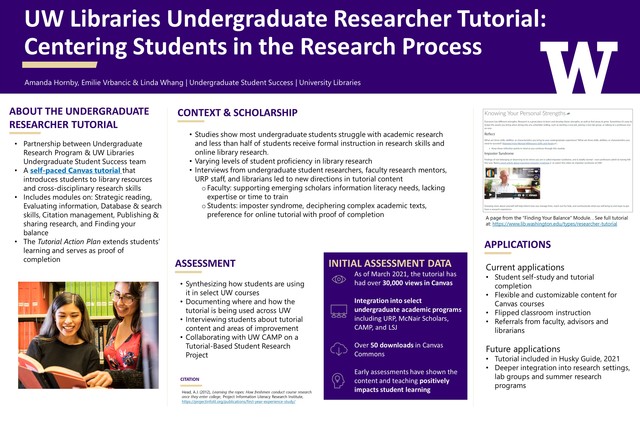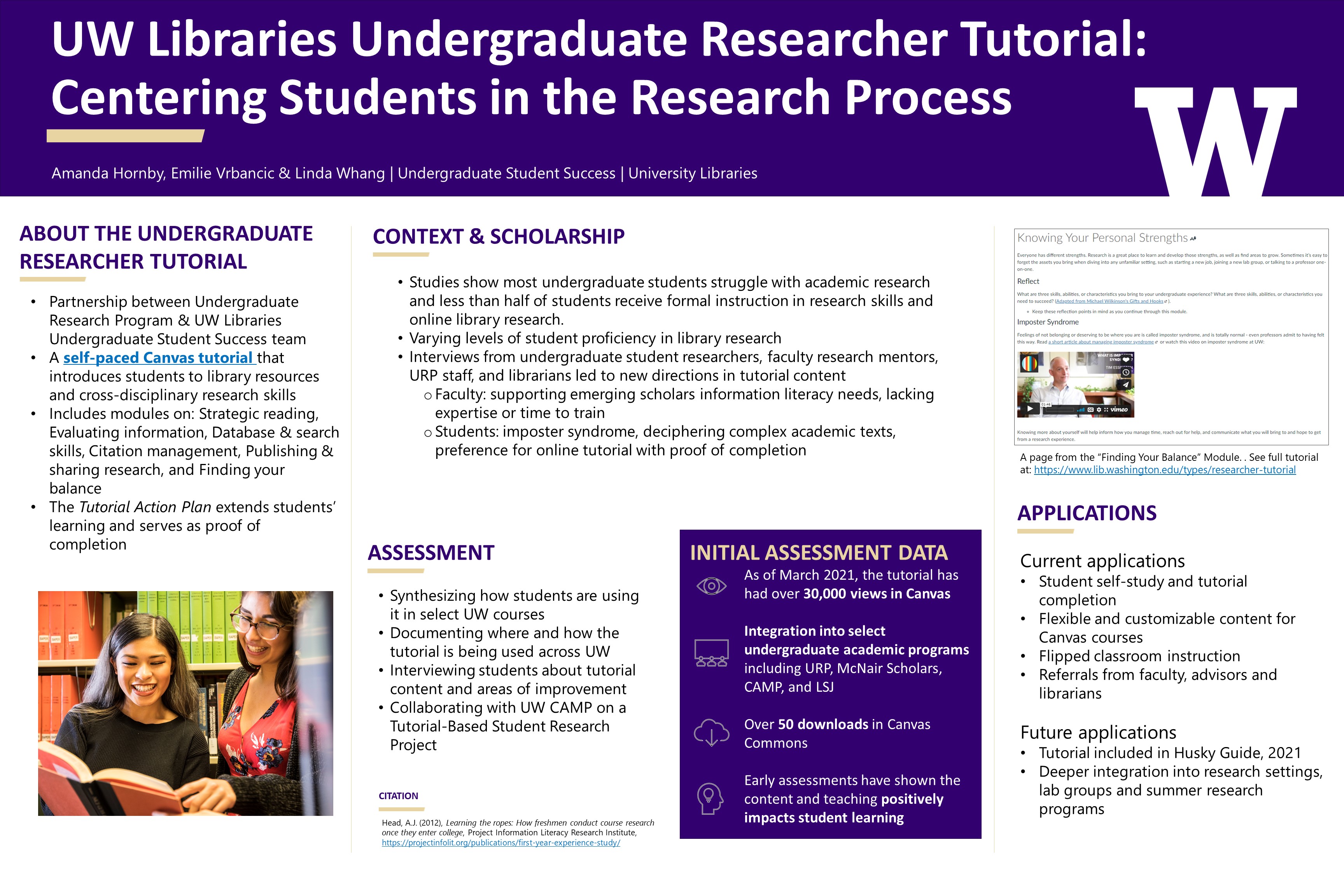Skip to main contentResource added 
The Undergraduate Student Success (USS) team identified the need for online instructional support for undergraduate information literacy through interviews with undergraduate student researchers, faculty, and URP staff. As we developed the tutorial modules, we learned faculty wanted to support students as emerging scholars but didn’t have the time, while students expressed feelings of imposter syndrome when working in a research team and doing advanced library research. Tutorial modules were developed to support the holistic UW research and learning experience. Students can work through the tutorial independently and faculty and librarians can integrate individual modules into their Canvas courses. In 2020-21, the USS team partnered with several UW programs, including URP, McNair Scholars, and CAMP, to provide instruction specialized to student research needs.
Each tutorial module can be easily adapted and includes learning goals and activities to demonstrate student learning. Whether instructors want their students to get up-to-speed on research and information skills at UW or want to assess where students need more research support, this tutorial is a one-stop teaching and learning resource. This poster will include reflections about the tutorial’s use and impact. It will also support instructors in using asynchronous learning to support student research and tap into students’ prior knowledge and lived experiences.
The Undergraduate Student Success (USS) team identified the need for additional instructional support for undergraduate information literacy instruction through interviews with undergraduate student researchers, faculty mentors, undergraduate research leaders, URP staff, and librarians. Additional interviews and feedback informed tutorial content and delivery. The tutorial was launched in fall quarter, 2020. Students can work through the tutorial independently and faculty and librarians can integrate individual modules into their Canvas courses. The USS team partnered with several programs on campus, including URP, McNair Scholars, and CAMP, to provide instruction specialized to student research needs. The tutorial launch coincided with the increase in remote learning due to Covid-19 and has helped the Libraries support instructors teaching online. This poster will include reflections from the USS team, URP staff, and students about the tutorial’s initial use and impact.
Each tutorial module can be easily adapted and includes learning goals and activities to demonstrate student learning. Whether instructors want their students to get up-to-speed on research and information skills at UW, or want to assess where students need more research support, this tutorial is a one-stop teaching and learning resource. We hope that instructors and research mentors will be encouraged to include and adapt the tutorial modules in their own courses and undergraduate research programs.
UW Libraries Undergraduate Researcher Tutorial: Centering Students in the Research Process

Full description
Video Presentation
Authors:
- Amanda Hornby, University Libraries, UW Seattle
- Emilie Vrbancic, University Libraries, UW Seattle
- Linda Whang, University Libraries, UW Seattle
Abstract:
Studies show most undergraduate students struggle with academic research and only 40% of students receive formal instruction in research skills and online library research . The UW Libraries and Undergraduate Research Program (URP) created a Canvas tutorial for undergraduate students to better support their holistic research skills. The UW Libraries Undergraduate Researcher Tutorial is self-paced and introduces students to library and cross-disciplinary research. Tutorial modules include strategic reading, evaluating information, database & search skills, citation management, publishing & sharing research and finding your balance.The Undergraduate Student Success (USS) team identified the need for online instructional support for undergraduate information literacy through interviews with undergraduate student researchers, faculty, and URP staff. As we developed the tutorial modules, we learned faculty wanted to support students as emerging scholars but didn’t have the time, while students expressed feelings of imposter syndrome when working in a research team and doing advanced library research. Tutorial modules were developed to support the holistic UW research and learning experience. Students can work through the tutorial independently and faculty and librarians can integrate individual modules into their Canvas courses. In 2020-21, the USS team partnered with several UW programs, including URP, McNair Scholars, and CAMP, to provide instruction specialized to student research needs.
Each tutorial module can be easily adapted and includes learning goals and activities to demonstrate student learning. Whether instructors want their students to get up-to-speed on research and information skills at UW or want to assess where students need more research support, this tutorial is a one-stop teaching and learning resource. This poster will include reflections about the tutorial’s use and impact. It will also support instructors in using asynchronous learning to support student research and tap into students’ prior knowledge and lived experiences.
The Undergraduate Student Success (USS) team identified the need for additional instructional support for undergraduate information literacy instruction through interviews with undergraduate student researchers, faculty mentors, undergraduate research leaders, URP staff, and librarians. Additional interviews and feedback informed tutorial content and delivery. The tutorial was launched in fall quarter, 2020. Students can work through the tutorial independently and faculty and librarians can integrate individual modules into their Canvas courses. The USS team partnered with several programs on campus, including URP, McNair Scholars, and CAMP, to provide instruction specialized to student research needs. The tutorial launch coincided with the increase in remote learning due to Covid-19 and has helped the Libraries support instructors teaching online. This poster will include reflections from the USS team, URP staff, and students about the tutorial’s initial use and impact.
Each tutorial module can be easily adapted and includes learning goals and activities to demonstrate student learning. Whether instructors want their students to get up-to-speed on research and information skills at UW, or want to assess where students need more research support, this tutorial is a one-stop teaching and learning resource. We hope that instructors and research mentors will be encouraged to include and adapt the tutorial modules in their own courses and undergraduate research programs.
Poster PDF
View a PDF version of the poster in Google Drive to enlarge the image or download a copy.
Comments
The presenter for this poster will be available to respond to comments during Poster Session 2 on April 20, 3:45-4:30 p.m.Comments
to view and add comments.
Annotations
No one has annotated a text with this resource yet.
- typeImage
- created on
- file formatjpg
- file size1 MB
- publisherUniversity of Washington
- rights


